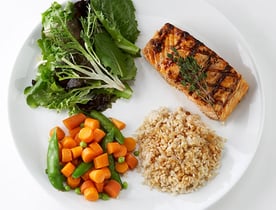 Over the past few years, healthy eating has taken the lead over fad diets for people who want to change their appearance and lifestyle. However, all the talk about which foods are healthy and which foods are not, has made healthy eating confusing.
Over the past few years, healthy eating has taken the lead over fad diets for people who want to change their appearance and lifestyle. However, all the talk about which foods are healthy and which foods are not, has made healthy eating confusing.
Protein
Well-known by athletes, bodybuilders and fitness enthusiasts, protein is an important part of a healthy diet. It's needed to repair damaged muscle, bone, skin, teeth and hair, and without enough of it your body will start to break down. Protein helps to build muscle and burn fat, but your body can't produce it like other nutrients, so you need to include it in your diet. Protein is made up of amino acids, and there are nine of them that can only be obtained through food.
There are two categories of protein: Complete and Incomplete
- Complete – Complete proteins contain adequate amounts of those important nine amino acids.
- Incomplete – Incomplete proteins make up the protein that's lacking in those nine amino acids.
Those nine amino acids that can only be obtained through food are very important to your body's health. They help create hormones that regulate your blood pressure and blood sugar levels. What are these nine essential amino acids?
- Lysine
- Leucine
- Histidine
- Isoleucine
- Methionine
- Phenylalanine
- Threonin
- Trytophan
- Valine
Although these complex words may not mean much, they are found in foods that are high in protein like eggs, cheese, red meat, poultry and fish. They are also found in vegetables like beans (black, kidney, pinto, lentil and chick peas), quinoa, pumpkin, broccoli and asparagus, as well as other foods like peanut butter, almonds, Greek yogurt and soy milk. While it may seem difficult to get enough protein per day, it is suggested to take in at least 1 gram for each pound of your lean body mass, for both men and women. More specifically, it is recommended to take in as many grams of protein as your target goal weight (Ex: If you want to weigh 120lbs, you should consume up to 120 grams of protein per day). Including some of these high-protein foods into your diet can help you reach your protein goals.
Carbs
Many people have eliminated carbs completely from their diet to avoid weight gain, but the truth is your body needs them. Carbohydrates are made up of sugar molecules, which your body breaks down into fuel for energy. Without carbs in your diet, you may feel like you are “running on empty” most of the time. Carbs are necessary in a healthy diet, but some are better for you than others.
There are two main types of carbohydrates: Simple and Complex
- Simple Carbohydrates – Contain mostly sugars found in processed foods and sweets like cakes, pies, donuts and cookies are simple carbs that will pack the pounds on, but they won't keep you healthy. You don't have to avoid these foods completely, but you should only eat them in moderation to stay fit and healthy.
- Complex Carbohydrates – Made up mostly of starches and fiber which slow down the absorption of simple sugars.Complex carbs are the healthy ones that you want to include in your daily diet to stay healthy. Great sources of complex carbs can be found in whole grain breads and pastas, brown rice, potatoes, corn, beans, legumes, green leafy vegetables, cereals and fruits.
Fats
Contrary to popular belief, fat plays an important role in keeping you healthy. It's good for your heart, muscles, nerves and testosterone levels. Fat also plays an essential role for hormones, called eicosanoids, that help regulate blood pressure, blood clotting and inflammation. Just like protein and carbs, fat should be included in your daily diet, but it's important to know which fats are healthy and which are not.
Healthy Fats: Monounsaturated and Polyunsaturated
- Monounsaturated Fats – Found mostly in high-fat fruits such as avocados, as well as olive oil and nuts like pistachios, almonds, walnuts, and cashews. Monounsaturated fats help lower bad cholesterol and raise good cholesterol, fight weight gain and reduce body fat levels.
- Polyunsaturated Fats – Found in foods like salmon, fish oil, sunflower oil and seeds. They remain liquid, even in the cold due to a low melting point. They also contain omega-3 and omega-6 fatty acids which your body can't produce, so it's essential to get them through food.
Unhealthy Fats: Saturated and Trans Fats
- Saturated fats – come mostly from animal products like red meat, pork, processed meats and dairy products. They aren't unhealthy, but should be eaten in moderation, as compared to healthier unsaturated fats, due to possible links to heart disease and obesity.
- Trans Fats – are the worst fats, and should be avoided if you want a healthy diet and lifestyle. They’re found in foods like French fries, potato chips, most fried foods, and some meats. Trans fats are man-made through a chemical process called partial hydrogenation that gives foods a high melting point and smooth texture, but eating it is very unhealthy.
So now you know a little bit more about protein, carbs and fat. Looking for help in starting your healthy eating plan? Let our nutritionists at Jax Sports help you create your own personalized meal plan today.


